by Leslie Layton
posted May 8
May 9 update: The Chico State Academic Senate approved a revised draft of the ceasefire resolution today, with only three votes in opposition.
The Academic Senate at Chico State University will consider a ceasefire resolution at its May 9 meeting that also supports what it calls “First Amendment Protections” for students opposed to Israel’s war in Gaza and for Jewish students.
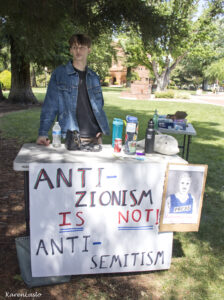
The meeting of the Academic Senate – a policy-setting body with 32 voting members representing the university’s various colleges – will come after what is likely to be two days of rallies this week on the lawn in front of Kendall Hall.
Students planned to gather today -– for the second time this week — to press for a ceasefire resolution from the Academic Senate and divestment from Israeli companies by the California State University (CSU) system. Fliers circulating on social media called on students at all campuses to participate in a May 8 Day of Action and “demand the CSU system stop supporting the genocide in Gaza …”
As the nationwide student protest movement grows, Chico State finds itself grappling with the need to protect both the rights students have to free speech while also discouraging anti-semitic and Islamaphobic messaging. President Steve Perez, in a May 3 email to the campus community, condemned what he said was anti-semitic graffiti found in a restroom, on a light post and in stairwells on campus.
“Let me state unequivocally — this cowardly and vile hatred has absolutely no place at Chico State,” Perez stated. “… any and all forms of discrimination are completely unacceptable.”
Meanwhile, some Arab and Muslim students say they’ve faced harassment and have struggled to feel safe enough on campus to voice their views.
Shaheera Abbasi, a Muslim student attending Butte College, said at the May 6 walkout that the event was held in part to mourn the enormous loss of civilian life in Gaza and “the fact that every time we step on this campus to mourn these lives and raise awareness, we have been faced with agitators …”
“Our organizing is simply tabling, calling for a ceasefire,” Abbasi said. “We’ve had students tell us that the bombing should continue, we’ve had students rip down things we’ve put up.”
At the protest earlier this week, both students and a few faculty addressed some 100 people, many of whom were seated in a semi-circle on the lawn.
Eran Zelnik, an Israeli Jew who teaches history at Chico State, spoke on what was coincidentally Holocaust Remembrance Day. Zelnik said the lesson that should have been learned from the Holocaust is that “there shouldn’t be another genocide.”
Referring to Israel’s assault on Gaza, Zelnik said, “It’s not really a war, it’s a massacre.”
As Zelnik spoke, a young man appeared for several minutes at the edge of the gathering, making an apparent attempt to drown him out with traditional singing. A so-called free speech facilitator in a bright, yellowish-green vest calmed him and the disruption ceased.
Organizers from Students for Justice in Palestine, Chico, had set up pieces of blue cardboard cut into the shape of 142 media vests, each one representing a journalist who has been killed, injured, reported missing or arrested since the war began. Small Palestinian flags lined the vests in rows.
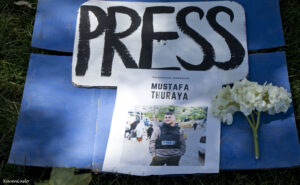
Bian Jabari, a Palestinian-American Butte College student, said she attended to support a “permanent ceasefire” because as the Israeli army moves into Rafah, “it is now very dire.” (Israel had seized the crucial Rafah border crossing with Egypt at the time of this story’s posting.)
Jabari was born in this country, but said her own family had been forced to leave Palestine and take refuge in Jordan before moving to the United States because of the Israeli occupation.
A tricky balance
Chico State University spokesperson Andrew Staples said there has been only a “slight uptick” in the last few weeks of reports of anti-semitism and “Islamic harassment,” and no formal complaints have been filed.
“I’ve heard the same reports you have,” he told ChicoSol, “and it is not part of our campus culture. We have no tolerance for that kind of stuff.”
Staples said the free speech facilitators — volunteers from the administration and staff — have been “trained in what free speech means” and attend as “neutral observers to bring the temperature down” as needed. Staples said they’ve been a “big hit.”
“There’s not a definitive definition of what hate speech is,” Staples said. “A sign that offends someone is most likely going to be protected under free speech principles.” But he said the university can respond to “pervasive harassment, words that incite violence, words that create an intimidating environment.”
“It’s tricky because what you consider offensive I might not,” he added.
After Perez sent the email condemning the anti-semitic graffiti, students organized a May 3 Shabbat-salat service on the lawn in front of Kendall Hall, honoring the faith traditions of both Jews and Muslims.
Activism & a draft resolution
The draft resolution that will be considered by the Academic Senate on May 9 states that universities have a “special obligation” to “support the free expression of ideas, values and opinions, even when they may be unpopular or controversial.”
Zelnik, who served as a tank commander with the Israel Defense Forces (IDF) as a young man, noted that criticism of Israel troubles many members of the Jewish community. After centuries of persecution, Jews find comfort in viewing Israel as their ancestral homeland.
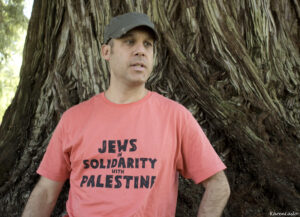
“It’s very helpful, very self-affirming to think that we have some kind of back-up plan, a place to go to just in case. That’s what humans do — they tell themselves very reassuring stories.”
But for Zelnik, who says he underwent a “time of reckoning and thinking” after serving in the Israeli army, that reassurance has been problematic and costly. “The history of Zionism is the history of privileging — privileging Jewish trauma over Palestinians, of not really seeing them as full-fledged people with a legitimate narrative,” Zelnik said.
The draft resolution to be considered May 9 points to facets of the war on Gaza that are typically considered markings of a genocide, and says that the International Court of Justice has found evidence to investigate Israel on genocide charges. For example, it says that the Isareli army “is using starvation as a weapon of war.”
The resolution recalls the Oct. 7 attack by Hamas that resulted in more than 1,200 deaths and the “ongoing captivity of more than 240 additional people.”
It also says the Israeli army has killed more than 34,596 Palestinians.
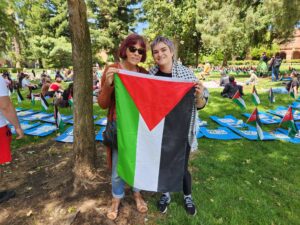
“Those who organize, write, teach and/or speak in support of Palestine or Israel within the United States and beyond have been silenced ….”, it says.
The draft says the Academic Senate calls for a “bilateral ceasefire,” the return of all hostages, and calls for “divestment” in the funding of any conflict by the U.S. government. It also calls for the establishment of a Middle Eastern North African study center and an interfaith council.
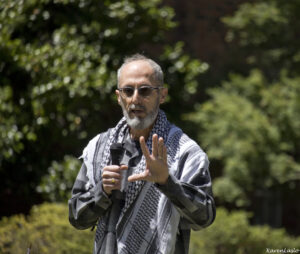
Middle Eastern history professor Najm Yousefi, who spoke to students at the May 6 walkout, commented on the argument that a resolution accomplishes nothing. “If it’s just one university, it makes no difference and Israel can ignore it,” he said.
But if ceasefire resolutions pass across the country, Yousefi said, it becomes impossible to ignore.
Public Health professor Lindsay Briggs also addressed the gathering Monday, noting that because of the threat of online harassment and doxxing, students who engage in activism face more challenges than in previous decades.
“You could take over a building in the 70s, but they couldn’t put you on the Internet,” Briggs said. “It’s scary, hard, and there are very real consequences.”
Briggs later said, in a social media post, that because of student activism the Academic Senate had voted to consider on May 9 the resolution. “This literally would not have happened without … your mobilization, and your passionate activism,” she wrote.
Leslie Layton is editor of ChicoSol.

Thank you for this informative article. I hope your efforts to pass a ceasefire resolution succeed, and that the university decides to divest from Israel.
Please print the text of the passed ceasefire resolution.
I am requesting the same of the Enterprise Record.
Thanks for this article. Hopefully there will be followup pressure on the part of the CSUC Academic Senate for divestment on the part of the CSU system from corporations that are involved in the genocide Israel has been waging against Palestinians. Also would love to see the full text of what the Academic Senate approved on May 9. G0od work, students!